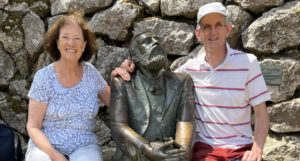Exeter in £10 million partnership to use data and AI to detect individual cancer risk

Doctors could soon be able to predict your individual chances of getting cancer and offer personalised detection and prevention, thanks to a new research project involving the University of Exeter.
Today, Cancer Research UK, the National Institute for Health and Care Research (NIHR) and the Engineering and Physical Sciences Research Council (EPSRC) are announcing £10 million to create the Cancer Data-Driven Detection programme.
The programme aims to access and link data from different sources – including health records, genomics, family history, demographics, and behavioural data – to develop advanced statistical models that help scientists accurately predict who is most likely to get cancer. Alongside this, the programme will develop powerful new tools which use AI to analyse the data and calculate an individual’s risk of cancer throughout their lifetime.
Within the partnership, the University of Exeter is leading a programme focused on people who go to their doctor with symptoms that could indicate they have cancer. Recent data shows that more than 350,000 patients were referred on an urgent suspected cancer pathway to hospitals in the South West. Of these, a quarter had to wait longer than the national target of four weeks to either be told that they had cancer, or to have cancer ruled out.
Programme lead Professor Gary Abel, of the University of Exeter Medical School, said: “Diagnosing cancer can be notoriously difficult, and health services in the South West are under extreme pressure. Our work in this exciting new partnership improve the intelligent use of investigations and referrals, which has the potential to take pressure off the system, diagnose patients sooner, improving time to treatment, and thus saving lives.
“We’ll consider vague symptoms, like weight loss and abdominal pain, and build AI and other models that will help guide GPs into what investigations to use with these patients. The models will draw on a range of data from medical records, on medications, test results, and other conditions to show GPs what the risk of different cancers are and which tests or investigations will be most useful in refining this risk .”Over the next five years, the funding will build the infrastructure required to access and link the datasets, train new data scientists, create the algorithms behind the risk models and evaluate the algorithms and AI tools to ensure that they are giving accurate and clinically useful information about cancer risk. The scientific programme will be guided by partnerships with cancer patients, the public, clinical experts and industry, while addressing ethical and legal considerations to ensure that the models and tools work well in practice.
The models generated from this research could be used to help people at higher risk of cancer in different ways. For example, the NHS could offer more frequent cancer screening sessions or screening at a younger age to those at higher risk, whilst those at lower risk could be spared unnecessary tests. People identified as higher risk could also be sent for cancer testing faster when they go to their GP with possible cancer signs or symptoms. Individuals at higher risk could also access different ways to prevent cancer.
Earlier diagnosis of cancer saves lives. Yet according to analysis of NHS figures by Cancer Research UK, only 54.4% of cancers in England are diagnosed at stages one and two*, where treatment is more likely to be successful. NHS England has set a target to diagnose 75% of cancers at stages one and two by 2028, and this will only be achieved with research and embracing new technologies to catch cancer earlier.
Dr David Crosby, Head of Prevention and Early Detection Research at Cancer Research UK, said:“The single most important thing we can do to beat cancer is to find it earlier, when treatment is more likely to be successful. With half a million cancer cases per year expected in the UK by 2040, we need a major shift towards more accurate diagnosis and detection of early cancer.
“The Cancer Data Driven Detection programme will link health data sources together and build the powerful new tools doctors need to identify those at highest risk of cancer and prioritise resources towards them.
“Moving towards a preventative approach to healthcare will not be easy and will take time. Cancer Research UK’s investment in the programme is an investment in the future of cancer care.”
Professor Lucy Chappell, Chief Scientific Adviser at the Department of Health and Social Care (DHSC) and Chief Executive Officer of the National Institute for Health and Care Research (NIHR) said: “Detecting and diagnosing cancer earlier is key to improved survival and quality of life for patients. By leveraging AI to enable healthcare professionals to identify people at a greater risk of cancer, this initiative could improve the way patients are screened and diagnosed. This programme’s AI-driven insights could lead to more effective treatment and improved survival, helping patients to live longer, healthier lives.”
Executive Director of Research at EPSRC, Jane Nicholson, said: “Earlier detection of cancer can provide a wider range of treatment options and save lives. This programme, leveraging the power of artificial intelligence and datasets, could revolutionise early detection and intervention.
“By working with a wide range of stakeholders, including cancer patients, the models and tools developed through the Programme could equip individuals with the crucial knowledge about their potential for developing cancer.”
Minister for Public Health and Prevention, Andrew Gwynne said: “When it comes to fighting cancer, every second counts. As the Prime Minister set out last week, we’re backing the power of big data and AI, which has the potential to help even more patients, including those with cancer, to help catch it earlier.
“Using the latest technology could revolutionise how the NHS diagnoses and treats patients. As part of this government’s Plan for Change, we will transform our health service from analogue to digital, and innovative projects like this show exactly how we will achieve it.”
Science Minister, Lord Vallance, said: “There are huge opportunities in AI to improve UK healthcare, from scans detecting illnesses earlier to bringing NHS waiting lists down by planning appointments more efficiently, and these will continue to develop.
“This investment in harnessing the potential of data to spot those at risk of cancer represents the sort of innovation the Government’s new AI Opportunities Action Plan sets out to realise, so this technology improves lives, while transforming public services and boosting growth.”
The Cancer Data Driven Detection programme is jointly supported by Cancer Research UK, the National Institute for Health & Care Research, the Engineering & Physical Sciences Research Council, Health Data Research UK, and Administrative Data Research UK.



